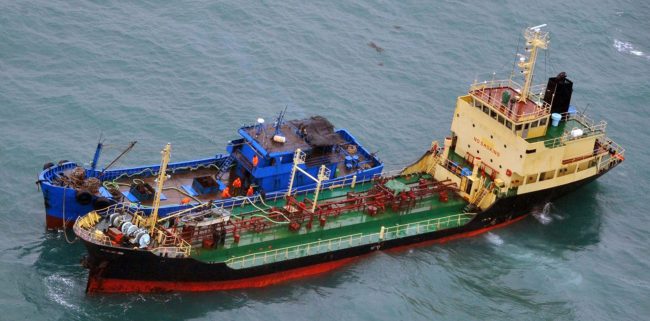The United States accused North Korea on Thursday of breaching a U.N. sanctions cap on refined petroleum by making illicit transfers between ships at sea, according to a document seen by Reuters, and demanded an immediate end to all sales of the fuel.

The United States submitted the complaint to the U.N. Security Council North Korea sanctions committee. The charge of a sanctions breach comes as Washington engages North Korea in a bid to convince Pyongyang to give up its nuclear weapons.
The North Korea U.N. mission did not immediately respond to a request for comment on the U.S. accusation. North Korea relies on imported fuel to keep its struggling economy functioning.
READ MORE: Canadian aircraft lands in Japan ahead of mission to monitor North Korean smuggling
The United States said that as of May 30, 89 North Korean tankers had brought in refined petroleum products illicitly obtained in ship-to-ship transfers this year.
The United States did not broadly say which countries it believed were illicitly providing North Korea with refined petroleum. But it does mention one case of a ship-to-ship transfer involving a Russian-flagged ship and one case involving a Belize-flagged ship.

Get daily National news
Reuters in December reported that Russian tankers had supplied fuel to North Korea by transferring cargoes at sea.
The 15-member Security Council capped refined petroleum product exports to North Korea at 500,000 barrels a year in December, down from a previous limit, adopted in September, of 2 million barrels a year.
WATCH: Pompeo sends message to Kim Jong Un, says ‘miracle could be yours’ if country replicates Vietnam’s path

According to the Security Council North Korea sanctions committee website, only Russia andChina have reported legitimate sales of some 14,000 tons of refined petroleum to North Korea in 2018.
“These sales and any other transfer must immediately stop since the United States believes the DPRK has breached the … refined petroleum products quota for 2018,” the United States said in a document submitted to the committee, using an acronym for North Korea.
The United States provided a list to the Security Council committee of the 89 North Korean tankers and a few select photos, seen by Reuters.
“If fully loaded at around 90 percent laden, DPRK tankers have delivered nearly triple the 2018 quota at 1,367,628 barrels,” the United States said.
READ MORE: Japan says Chinese ship was transferring cargo to North Korea, defying sanctions
It asked the North Korea sanctions committee to issue an urgent note to all U.N. member states notifying them that North Korea has breached the refined petroleum cap and order an immediate halt to all transfers.
The U.N. Security Council has unanimously boosted sanctions on North Korea since 2006 in a bid to choke off funding for Pyongyang’s nuclear and ballistic missile programs, banning exports including coal, iron, lead, textiles and seafood, and capping imports of crude oil and refined petroleum products.
In March the council blacklisted dozens of ships and shipping companies over oil and coal smuggling by North Korea.







Comments